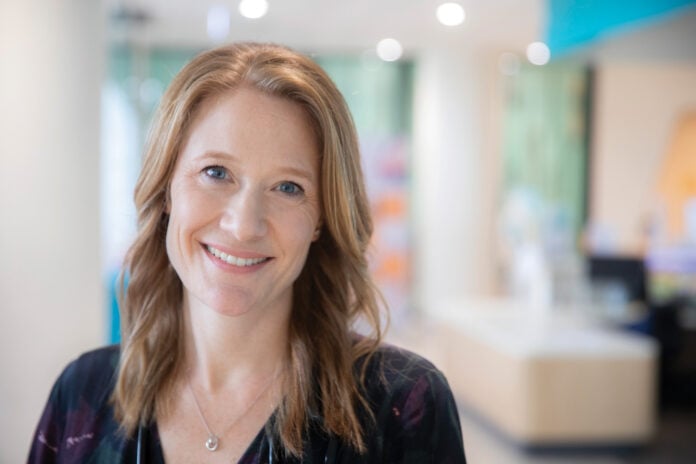Summarising the career of Associate Professor Kirsten Perrett (née Angus) MBBS FRACP PhD (OM 1993) is no small task. Highlights include her work on clinical trials with the Oxford Vaccine Group and time as a visiting scholar at Stanford University with the Lucille-Packard Children’s Hospital Vaccine Program. Today she holds multiple concurrent roles: in allergy research at the Murdoch Children’s Research Institute, as a paediatric allergist and vaccinologist at the Royal Children’s Hospital, and as a Honorary Principal Fellow at the University of Melbourne.
All this merely grazes the surface of Kirsten’s professional life – one that was shaped by early encouragement to ask questions and pursue ideas. “My father was a scientist and my mother a teacher, so I was raised with science and learning around me,” she says. “I also grew up with a strong moral code to make the most of one’s gifts and to help others.”
Kirsten’s foundational years also included attending Grimwade House from Prep to Year 6. She is still connected to the School community today through fellow Old Melburnians and as a parent, with two of her four children currently attending Grimwade House. “I have such fond memories of my time there,” she says. “We were so spoilt with opportunity and nurtured by beautiful people like Marion Church, Peter Valder and Margot Wood.”
The path from an early interest in science to clinical research involved dedication, hard work, and one significant detour. After achieving her medical qualifications, Kirsten and her husband decided to volunteer in Mongolia through the AusAID programme. “I’d only been a doctor for two years before we went,” she explains.
“I worked on a project at the maternal and child hospital in Ulaanbaatar, and it was there that I saw how much disease could be prevented through research, education and sharing knowledge.”
As her career progressed, Kirsten came to focus on the growing need for food allergy prevention. “The ultimate goal of my research today is the eradication of food allergy,” Kirsten explains. “For those we can’t prevent, we are testing early intervention strategies so children have the best chance of going to school without their EpiPen – without the burden a food allergy places on their lives.”
“Australia is a leader the field in terms of research into prevention and early intervention,” she adds. “The incidence of food allergy has been rising for more than 30 years, but we’re on the brink of research results that will show whether the tide has turned.”
While research makes up a large part of Kirsten’s work, she still finds fulfilment working directly with patients each week. “Interacting with children is so rewarding,” she says. “I love the immediacy of being able to help the child in front of me, optimise their current health issues and try to intervene to prevent long-term problems.”
Alongside clinical work, research and family life, Kirsten still sees the importance of encouraging others to ask questions and explore new knowledge. “I’m part of a mentoring program at the Murdoch Children’s Research Institute and I’m also involved in a clinical research incubator aimed at fostering and nurturing clinician researchers at the Royal Children’s Hospital,” she says. “I’m passionate about inspiring the next generation to find out what the problems are, and to discover how they can contribute to the solution.”



